- Home
- V. E. Schwab
The Near Witch Page 4
The Near Witch Read online
Page 4
Eventually Otto’s house comes into sight, and just beyond it, ours. The moor takes over beyond our yard, fluttering out like a cape. A wood stack sits to one side of our house, a small vegetable garden to the other, clumps of green interwoven with orange and red. The garden belongs to Wren more than me. Few things flourish in moor soil, but Wren loves our little plot, and shows an odd streak of gentleness whenever she tends it. Sure enough, that’s where she is now, perched on a stone just outside the marked-off patch, gingerly plucking a weed from the dirt.
“You’re back,” she calls as I draw near.
“Of course. Where is everyone?” My exit from the town square wasn’t my most subtle departure, and my uncle will have words for me, I’m sure.
“Wren.” My mother’s voice wanders like smoke from the house, and a moment later she’s standing in the doorway, her fine dark hair curling in wisps around her face. Wren hops down from the stone and skips over to her. My mother’s eyes find mine.
“Lexi,” she says, “where did you run off to?” Her down-turned mouth confirms it. Otto will indeed want words with me.
“Helena had forgotten something for me at her house,” I say, the lie building in my mouth only a moment after I think it. “She was so swamped by her audience, she asked me to go get it myself.” I feel around in my dress pockets for proof, but they’re empty, so I pray my mother doesn’t ask for evidence. She doesn’t, only blows out a small breath and floats back inside the house.
I miss my mother. I miss the woman she was before my father died, the one who stood straight and proud and looked out at the world with fierce blue eyes. But there are rare moments when it helps that she’s become a shell, a ghost of her former self. Ghosts ask fewer questions.
I turn away from the house. I’m losing my lead. Soon Otto will figure out where the stranger is, if he doesn’t know already. If I’m going to find him, I clearly need to catch him off guard. But how? I smooth my hair back and peer up at the sky. The sun is still high and the wood stack by the house is low, and I feel the need to move. I set aside my ruined slippers, take the boots from the side of the house, and trudge off in search of kindling.
* * *
The ax comes down on the wood with a crack. My dress is dirty and my boots are caked with mud from stomping through the fields after the rain. They were my father’s—dark brown leather with old buckles, soft and strong and warm, the insides worn to fit his feet. I have to stuff the toes with socks so they won’t fall off, but it’s worth it. I feel better wearing them. And they look better this way, freshly stained. I cannot imagine them clean and in the cupboard.
Sitting still is not a skill I have. I never could stop moving, but it’s gotten even worse these last three years.
A bead of sweat runs down my face, instantly cooling in the late afternoon air. I put another piece of wood on an old tree stump that sits between Otto’s house and ours, lift the ax, and bring it down again.
This feels right.
My father taught me to chop firewood. I asked him once if he wished he had a son, and he said, “Why? I’ve got a daughter just as strong.” And you wouldn’t guess it by my narrow frame, but I am.
The ax comes down.
“Lexi!” bellows a deep voice behind me. I set the ax on the stump and begin picking up the split wood.
“Yes, Uncle Otto?”
“What do you think you’re doing?”
“Chopping wood,” I say, my voice on the narrow line between matter-of-fact and rude.
“You know to leave it. Tyler can come around and do it for you.”
“The stack was low, and my mother needs it to bake. I’m only doing what you wanted, Uncle. Helping.” I turn and head for the wood stack. Otto follows.
“There are other ways for you to help.”
Otto is still wearing his Protector face; his voice stern, edged with power. It may be his face and his voice, but it’s not his title. It was my father’s first.
“And where are your shoes?” he asks, looking down at the mud-caked boots.
I drop the wood into the middle of the stack, and turn. “You wouldn’t want me to ruin them, would you?”
“What I want is for you to listen to me when I tell you to do something. And more importantly, when I tell you not to do something.”
He crosses his arms, and I resist the urge to mimic him. “I don’t know what you mean.”
“Lexi, I told you I didn’t want you to go off today. Don’t try to tell me you didn’t.”
I test out the lie a moment on my tongue, but it won’t get past Otto as easily as it did my mother.
“You’re right, Uncle,” I say with a patient smile. One of his eyebrows peaks, as if he suspects a trap, but I go on. “I did go in search of the stranger, and look what I came back with.” I hold my hands wide. “Nothing.”
At the stump, I lift the ax, my fingers sliding into my father’s grooves.
“It was a foolish task,” I add. “I couldn’t find him. He’s gone.”
The ax drives deep into the stump, sticking with a heavy thud.
“So I came home. And here I am. Relax, Uncle. All is well.” I dust my hands off, let one come to rest on Otto’s shoulder. “So, what did Helena have to say?”
“Not enough,” says Otto, looking down at my father’s boots. “Says she saw something, a shadow, maybe our stranger, in the clearing by her house. Claims she doesn’t know which way he went. That he just vanished.”
“Helena’s always loved a good story,” I offer. “She can make one out of nothing.” It is a lie, of course. She prefers to have me tell the stories to her.
Otto isn’t even listening. He’s looking over me, and his eyes are even farther away. Dark, lost eyes.
“What happens next?” I ask.
He blinks. “For now, we wait.”
I manage to nod calmly before I turn away, the frown creeping across my face. I don’t trust for a minute that that’s all my uncle has in mind.
* * *
Tonight there is no moon, and therefore no moonlight playing on the walls. Nothing to entertain those who cannot sleep. I am unbearably awake, but not because of the stranger.
It’s the wind.
That same sad note is back again, weaving through the air, and there’s something else, a sound that makes me shiver. No matter how I turn away or bury my face in the sheets, I keep hearing something—or someone—calling, just loud enough to pierce the walls. The voice is surely something more than wind, curling and twisting itself into highs and lows, like muffled music. I know that if only I could lean closer, words would become clear, distinct. Words that wouldn’t break apart before I can wrap my mind around them.
I push the covers back, careful not to wake Wren, and let my feet slide to the wooden floor. Then I remember my father’s words and pull my feet back into bed, hovering awkwardly on the edge, halfway between the motion of standing and slipping back down.
The trees all whisper, leaves gossiping. The stones are heavy thinkers, the sullen silent types. He used to make up stories for everything in nature, giving it all voices, lives. If the moor wind ever sings, you mustn’t listen, not with all of your ears. Use only the edges. Listen the way you’d look out the corners of your eyes. The wind is lonely, love, and always looking for company.
My father had lessons and he had stories, and it was up to me to learn the difference between the two.
The wind howls and I discard my father’s warning, stretching my ears to meet the sound, to unravel it. My head begins to ache dully as I listen, trying to make words where there are none. I give up, slipping back beneath the sheets, folding myself into my cocoon so that the wind song comes through broken.
Just as I’m about to find sleep, Wren shifts beside me. She rouses, and I hear the soft padding of feet as she slides from the bed and crosses the room, slipping out in search of our mother’s bed.
But something is off.
There’s a slight creak, the sound of footsteps over one of
the two warped boards between the bed and the window. I sit up. Wren is standing, framed by glass and wooden borders, her blond hair almost white in the darkness. Without the shell of blankets, I can hear the wind again, the music on it, and the almost-words that hum against my skull.
“Wren?” I whisper, but she doesn’t turn around. Am I dreaming?
She reaches one hand up to the clasp pinning the window shut, and turns it. Her small fingers curl around the bottom lip of the window, trying to slide it up, but it weighs too much for her. It has always weighed too much. I realize for the first time that the shutters are open beyond the window glass. I don’t remember unlocking them, but there they are, thrown back, exposing the night beyond. Wren presses her fingers against the wooden lip, and somehow the window begins to slide up a fraction.
“Wren!”
I’m out of bed and at her side before she can get any farther, pulling her back into the room and closing the gap where the cool air is seeping in. I look for something out on the moor, something that would have drawn my sister to the window, but there is nothing. Nothing but the usual black-and-white night, the stray trees and rocks and the humming wind. I turn to face Wren, barring her path, and she blinks, the kind of startled blinks of a person waking suddenly. At my back the wind presses against the glass, and then it seems to break, dissolving into the dark.
“Lexi? What’s wrong?” she asks, and I must seem crazed, stretching myself across the window frame and looking at my sister as if she’s possessed. I peel myself from my post, ushering her back to bed. On my way I light the three candles, and they burst to life and fill the room with yellow light. Wren slides beneath the covers, and I climb in beside her, resting my back against the headboard, facing the candles and the window and the night beyond.
5
Knock. Knock. Knock.
I curl deeper beneath the blankets. I can tell by the smell alone that it’s morning. Bread and late-summer air. I don’t know when I fell asleep, or if I only slipped into that space between…
Knock. Knock. Knock.
I hear the front door open.
My shoulders and neck are stiff, my head pounding and my thoughts too thick as I pull myself from the bed and lean back against it. I listen, but the voices at the door are too low to be deciphered through the walls. One grumble is distinct enough, and I wonder how long Otto has been here. I pull my clothes on and open my bedroom door, pausing in the doorway.
“Sometimes boys wander off, Jacob,” says Otto.
Jacob Drake?
“Think,” adds my uncle. “Where might he have gone?”
“No,” answers a thin, nervous voice. It is indeed Mr. Drake, Helena and Edgar’s father. “He wouldn’t. He’s afraid of the dark… Afraid of the day, too.” He adds a sad, strangled chuckle.
I hear Otto pacing back and forth. “Well don’t just stand there,” he says finally. “Come in. You too, Bo.”
I wait until they’ve gone into the kitchen before slipping in behind them.
“Could someone have taken him?” asks Otto, accepting a mug of coffee from my mother.
Mr. Drake is slight and unimposing, with hair that must once have been as white-blond as Helena’s and Edgar’s, but now is flecked with silver. He stands in the middle of the kitchen, crossing his arms and then uncrossing them as he and Otto talk.
“No, no, no,” he mumbles. “Who? Who’d have taken him?”
“Did anyone see anything?”
My mother is kneading dough, and shakes her head slowly. Bo limps over to the table and leans against it. The limp is subtle, the relic of a bad fall a few years back, but it makes his steps sound uneven on the floorboards. He chews on a wedge of berry-flecked bread, eyes darting between the other two men.
“What’s going on?” I ask.
“Edgar’s gone,” says Mr. Drake, turning tired eyes toward me.
My stomach drops. “What do you mean, gone?”
There’s a knock at the door, and Mother disappears to answer it, Otto still trying to calm Mr. Drake down.
“Let’s talk this out,” says my uncle. “Walk me through it…”
Mother reappears, an old man on her heels. Not old like the sisters, who seem to crumble and yet never change. Simply old. Master Eli. From the Council. His iron-gray hair looks sharp, trailing across his gaunt face. I take a small step back to make room. Mr. Drake and Otto have their heads bowed together, talking, Bo leaning in with one shoulder as if only half interested. They all look up as Master Eli takes a seat.
“What do we know?” he rasps. Something creaks, and I don’t know if it’s him or the chair. Otto straightens, turning to address the Council member.
“Edgar vanished from his bed last night,” he explains. “There’s been no sign of him. No sign of struggle. We’ll call together a search party. He can’t have gone far.”
“I just don’t understand,” mumbles Mr. Drake.
Otto offers a determined frown and sets his mug down. I notice that his hands are red, and he’s still wearing his butcher’s smock. He clamps his hand on Mr. Drake’s slight shoulder and promises that they will find his son. When he lets go, his fingers leave behind a smudge of half-dried blood.
“We don’t know any more than that yet, Eli,” he says. My uncle is probably the only man in town who can get away with calling the Council members by their names but not their titles. A small benefit of his station, and one he apparently enjoys.
“Poor boy,” murmurs my mother, and I turn to see her comforting Wren, who seems perplexed. I can tell my sister thinks our mother is overreacting.
“Stop worrying,” Wren says, trying to get free. “He’s just playing a game.”
“Hush, dear,” says my mother, casting a glance at the rest of the room. Master Eli gives her a strange look, and it’s hard to tell if it’s pity or something harsher. His eyes are dark, set deep beneath his brow. His face crinkles up like paper.
“It’s a game,” Wren persists. “I’m sure of it.”
But I am not so sure. I saw my little sister try to climb out the window last night. I reach for Wren’s hand as the men in the kitchen gather their guns and murmur the names of a dozen others they can recruit.
“Otto,” Bo chimes in for the first time, “the rest are waiting in town for word. Where will we start looking?”
“We’ll meet the others in the square. We can start there and work our way out to all sides.”
“That’s a waste,” I cut in. “You should start at Edgar’s house and head out toward the village perimeter, not in toward the center.”
“Lexi,” warns Otto, casting a glance around the room. Bo wrinkles his nose. Mr. Drake turns away. Master Eli leans back in his chair and looks vaguely amused. Vaguely. Otto turns red.
“Edgar’s house is in the west,” I press, “so you start there and work away from the village. It doesn’t make much sense to spend time heading inward.”
“And why is that?” asks Master Eli. His amusement is cool and cutting. His eyes seem to say, Foolish little girl.
“If someone did take Edgar,” I explain calmly, “they’d never try to hide him in town. There’s too many people in too small a space. They’d take him out, away from the houses. Toward the moor.”
The old man’s smile fades as he turns back to my uncle, waiting. Otto picks up the cue.
“Lexi, I’m sure your mother could use help with the baking. Go be useful.” I have to clench my jaw to keep from answering. “Let’s go,” he says, turning his back on me.
Bo and Mr. Drake follow Otto. Master Eli pushes himself to his feet. I can hear his bones cracking and popping into place. He passes Otto and pauses, resting a skeletal hand on my uncle’s shoulder.
“Do you have a plan?” he asks, and I swear his deep-set eyes swivel back in my direction.
Otto looks offended, but he quickly checks himself.
“Yes, of course.”
Master Eli gives a short nod and continues past my uncle, who turns on his heel and li
fts his gun from the counter.
“Let me go with you, Otto,” I say.
“Not today, Lexi,” my uncle says, his voice a fraction softer without the other men around. “I can’t.”
“All children,” says Master Eli from the door frame, “are to remain at home until the culprit is caught and the boy found.”
“I’m not a child, Master.” And I certainly won’t be bossed by you, I add silently.
“Close enough.” And then he’s gone. Otto follows him out. I linger in the doorway, just out of sight, and hear them as they reach the front door and join the two other men, boots scuffing the threshold.
“What about the stranger?” asks Mr. Drake, and my chest tightens. The stranger. I’d almost forgotten about him. Almost.
“He appears here in the village, and the next night a child vanishes,” says Bo.
“I knew something like this would happen,” grunts Otto. “I should have dealt with him yesterday.”
“No one blames you for waiting.”
“You know where he is?” asks Mr. Drake.
“Of course we know.”
“We are relatively certain,” corrects Master Eli in a creaking voice, “that he is with the Thorne sisters. If he’s still in town.”
“Why would a stranger take Edgar?” asks the boy’s father softly.
“More likely a stranger than any of us,” says Otto. I hear him shift his gun in his arms.
“Why would anyone take him?”
“Start with what we know.”
“And what is that?”
“There is a stranger in the town of Near. And now a boy is missing.”
That’s not much, I think.
“First things first. The boy. We’ll deal with the stranger later.”
The door swings closed and the men are gone. I wait for the sound of their boots to fade before retreating into the kitchen. My mother goes back to her bread, her mouth settling into a thin line, a faint crease between her eyes as her fingers find their way absently over loaf pans and proofing bowls. Back to work, as if nothing’s changed. As if there isn’t a growing mass of questions, all tangled up.

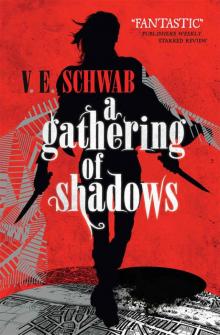 A Gathering of Shadows
A Gathering of Shadows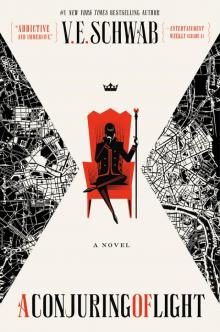 A Conjuring of Light
A Conjuring of Light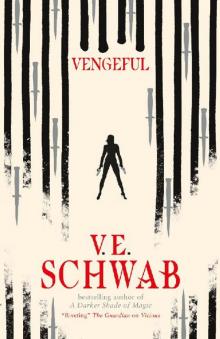 Vengeful
Vengeful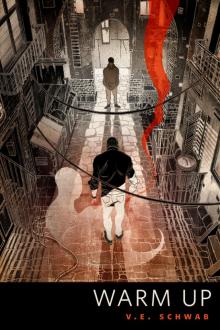 Warm Up
Warm Up The Near Witch
The Near Witch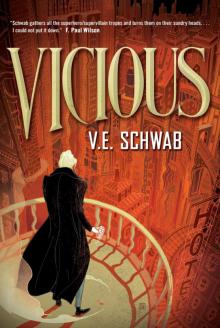 Vicious
Vicious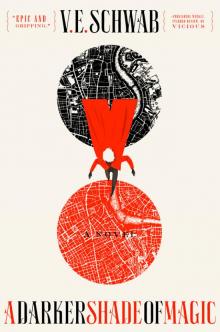 A Darker Shade of Magic
A Darker Shade of Magic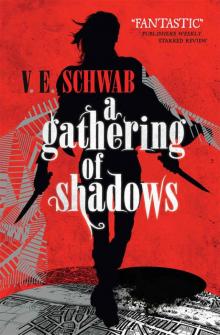 Gathering of Shadows (A Darker Shade of Magic)
Gathering of Shadows (A Darker Shade of Magic)